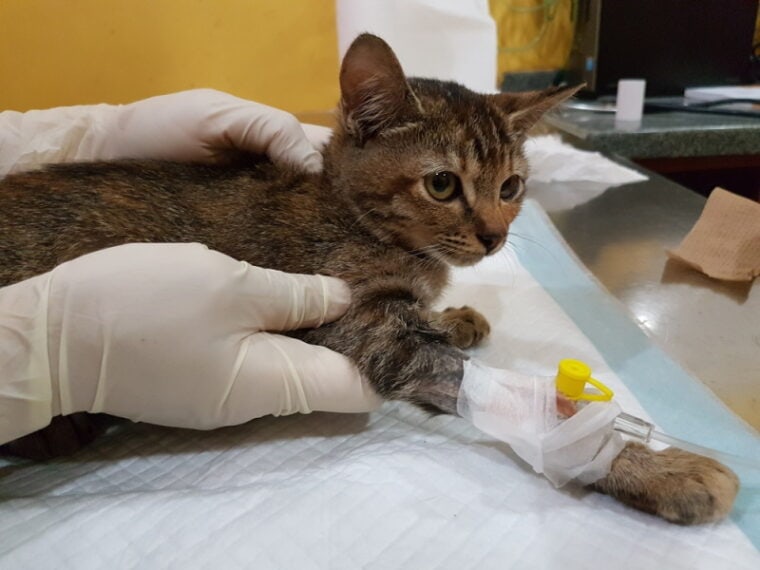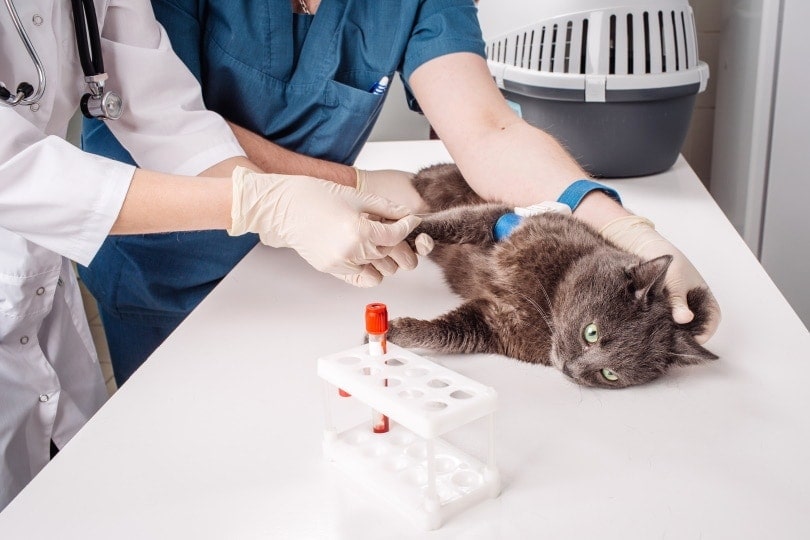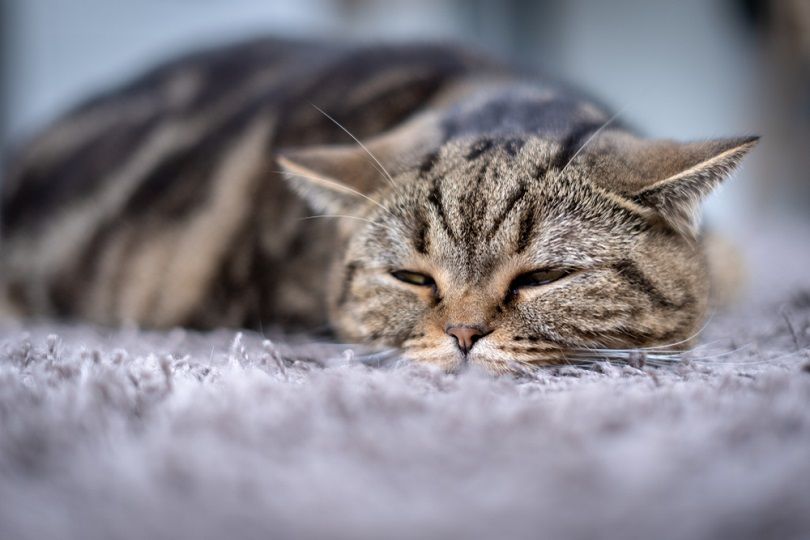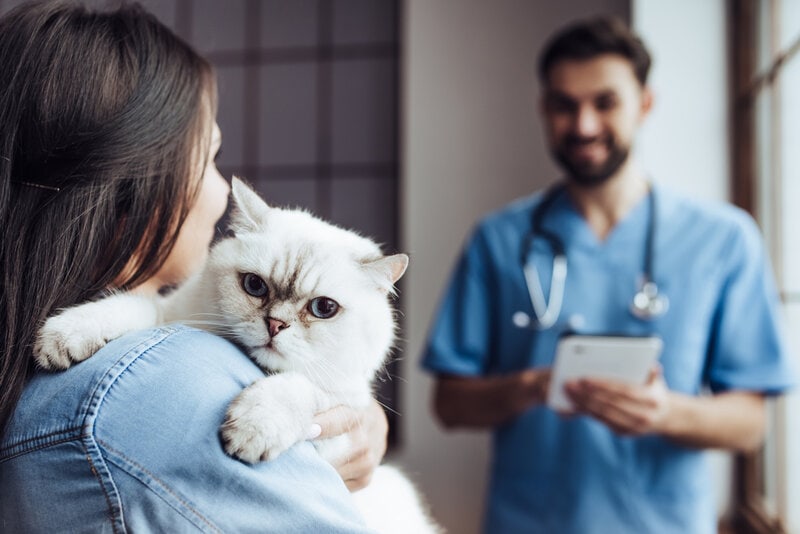
Click to Skip Ahead
One of the most common conditions we see in middle-aged to older cats is kidney or renal failure. Most commonly, this will be a chronic condition in cats with kidney(s) that are slowly losing function over a period of months to years. Once the kidneys have progressed to a certain point with chronic disease, there is very little that can be done for the affected cats. The kidneys won’t typically recover, but the cat can be kept comfortable.
Other cats will suffer from an acute kidney injury. Depending on the cause, there may be aggressive treatments available to help the cat fully recover. Unfortunately, most acute cases of kidney failure will eventually lead to complete kidney failure, from which cats can never fully recover.
What is Kidney Failure?
There are different stages to kidney failure—often abbreviated as CRF, for Chronic Renal Failure. Without going into detail, cats are considered in CRF if there is a persistent loss of kidney function over weeks to months. Kidneys function to filter the blood in the body and make urine. With kidney failure, either one or both kidneys cannot filter the blood properly. This causes loss of protein and other molecules into the urine.
Every cat, unless they are born with a congenital abnormality, are born with two kidneys—one on the right side and one on the left side of the mid abdomen. A cat may not show any abnormalities if just one of its kidneys are affected, as the other kidney will compensate to do the job of both. However, as the disease progresses, both kidneys will typically fail, and abnormal signs are then noticed.
How Can My Vet Diagnose Kidney Failure?
Kidney failure cannot be diagnosed by a physical exam alone. Your veterinarian will have to complete testing on both blood and urine samples from your cat to diagnose kidney failure. The combination of having elevated BUN (blood urea nitrogen) and creatinine in bloodwork with dilute (or non-concentrated) urine gives this diagnosis. Oftentimes, the phosphorus and a value called SDMA (symmetric dimethylarginine) will also be elevated in bloodwork.
Depending on how your cat is feeling and what levels these values are at in their bloodwork will help your veterinarian decide what type of treatment your cat needs. Also, your veterinarian will also take into account if your cat is dehydrated, if they have a UTI, or any other factors that may contribute to any diagnostic abnormalities.

Signs of Kidney Failure
When the kidneys start to fail, they are unable to make concentrated urine. Therefore, a lot of the liquid a cat will drink will easily get urinated out. You may notice your cat drinking and urinating excessively. Often, the areas in the litterbox are much larger than usual, and you may not even notice an odor or color to the urine. To counteract the increased urinations, your cat will drink more than usual. Even with excessive drinking, animals with kidney failure will still typically be chronically dehydrated.
Other signs of CRF include weight loss over weeks to months. You may not notice this immediately, but your veterinarian may notice a slow decline in weight during exams. You may also start to notice that you can feel your cat’s spine or ribs when you pet them.
As kidney failure progresses, one of the most common abnormalities is nausea and vomiting. This will then lead to even more dehydration. Often, owners may think their cat ate something that upset their stomach, only to be surprised when their cat’s bloodwork shows renal failure.
Cats with kidney failure will also develop a distinct odor to their breath. The odor is from the waste products building up that the kidneys are unable to excrete. Not everyone will notice this smell, but it can be very distinct to some people.
Is Chronic Kidney Failure Curable?
The short answer is no. Once the kidneys have degenerated to a certain point, they are unable to heal and/or regenerate. When this occurs with humans, they will be put on dialysis and potentially receive a kidney transplant. While dialysis is available in very limited areas of the country for veterinary patients, it’s few and far between. Patients are screened to determine if they are even a candidate, and if they are, owners are often unable to pay for the procedure. Kidney transplants are not a current practice in veterinary medicine.
While CRF cannot be cured, many cats can have a good quality of life, and can live for months to years after diagnosis with supportive care. This depends on how sick your cat is, and how much their kidneys are still functioning or not.

What Are Treatment Options for Chronic Kidney Failure?
Your veterinarian will discuss the best options based on how sick your cat is, and what their bloodwork abnormalities are. Sometimes, cats need to be hospitalized for multiple days on IV fluids and medications. Other times, cats can be treated by switching their diet to a prescription kidney diet and possibly giving fluids at home.
Keep in mind that each case is different. Your veterinarian will help you navigate all of the treatment options available.
What is Acute Kidney Injury?
While chronic kidney failure occurs over weeks to months, acute kidney injury is when damage occurs to the kidneys in a matter of hours to days. If the acute injury is not diagnosed and/or not treated in a timely manner, this can progress to acute kidney failure.
Acute kidney injury differs from CRF in that it’s not a slow degradation. Things that can cause acute injury are a bacterial infection of the kidneys (pyelonephritis), leptospirosis infection, ingested toxins (such as lilies and NSAIDs), blood clots, and cancer.
Please contact your regular veterinarian if you notice anything abnormal with your cat. If you know that your cat ingested or licked lilies, ate human or animal NSAIDs, blood pressure medications, etc.—please contact your veterinarian or Poison Control immediately.
Can a Cat Recover From Acute Kidney Injury?
While some cats can recover, the mortality rate is still very high. Cats with acute kidney injuries almost always need to be hospitalized with aggressive care. This often means high rates of IV fluids, potentially antibiotics if there is an infection, and medications to help with appetite, stomach ulcers, vomiting, and blood pressure. Other cats’ only chance for survival may be dialysis. This may not be an option for many owners due to the cost, and there may not be a facility nearby that offers this service.
Rarely, cats with acute kidney injury can be treated with at-home therapy. Unfortunately, financial constraints may prohibit owners from being able to pursue hospitalization for their cat. When your cat requires around-the-clock care, just like at a human hospital, costs can quickly climb.
Some cats will still pass away from acute kidney injury despite providing the best care available. The best thing you can do for your cat is contact your veterinarian to discuss all possible options.

Conclusion
Chronic renal failure, or CRF, is a common disease of many middle-aged to older cats. Some cats can have a good quality of life if they are diagnosed early and managed well by their veterinarian. Unfortunately, the disease will progress over time, and there is no cure.
If a cat suffers an acute kidney injury, survival is possible but still difficult. Quick, aggressive care is needed for most of these cats to have a chance to recover. Any cat with kidney disease, whether acute or chronic, should be managed by a veterinarian.
Featured Image Credit; Andy Gin, Shutterstock







